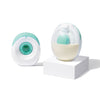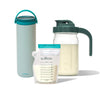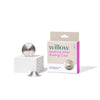Hey mama! Here’s the 411: breastfeeding is hard (we know that first hand) but there are also so many benefits for you and your baby. From the abundance of health benefits like help with postpartum recovery to the long-term infection-fighting antibodies, breast milk is considered the (liquid) gold standard for infant nutrition for a reason. But it’s also challenging and new and can be totally different from baby to baby— which is why we’re here to help.
Keep reading to learn about the key benefits of breastfeeding.
The Benefits of Breast Milk for Baby
Breastfeeding and breast milk are highly beneficial for your baby’s health and well-being. Not only can it help your baby reach their birth weight faster and fight off illnesses but it has some but it has some surprising benefits that you may not be aware of!
It’s Alive! Breast Milk is Nutrient Dense
Breast milk is rich in protein, sugar, vitamins and minerals, plus numerous bioactive components—like hormones, growth factors, enzymes and live cells—to support your baby’s growth and development. Another thing that’s mind-blowing? The nutrients found in breast milk contain properties that help fight infections. For example, up to 80% of breast milk consists of whey protein which works to prevent future infections and help your baby ward off disease.
The antibodies and enzymes found in breast milk cannot be added or replicated in formula or animal milk and it’s this reason that breast milk is so special.
Breast Milk Has Antibodies
So, we keep talking about the antibodies. But what gives? The most concentrated amounts are found in colostrum at the earliest stage of your breast milk production and feeding journey. It’s for this reason that asking for support from your nurses, lactation consultant, doula, family and friends is critical in the hospital—giving your baby that first milk sets them up for disease-fighting success in the future.
So, even though it’s all a whirlwind and it will be new for you and your baby, getting them that colostrum is amazing for their long term health. It’s also possible for a mother to pass on some of their antibodies from illnesses they have had in the past through breast milk which is why breastfeeding, especially your newborn, is so important.
Breastfeeding May Reduce Risk of Illness, Viruses and Allergies
Because breast milk contains powerful antibodies, enzymes, and antioxidants, this may reduce the risk of illnesses, allergies, and conditions like eczema and asthma. Breast milk can even decrease the risk of more serious conditions like bacterial meningitis, tumors, and sudden infant death syndrome.
Breast Milk Promotes Healthy Weight Gain
Feeding your baby breast milk promotes healthy weight gain, and it can actually prevent obesity problems in the future. Studies have shown that infants who are breastfed for over four months had a significant reduction in odds of childhood obesity. Babies are experts at intuitive eating, because they only eat when they are hungry. This ultimately helps babies develop healthier eating habits and abstain from overeating.
Breast Milk Helps Keeps Your Baby’s Diet Consistent
Breast milk has everything your baby needs to grow in its first stage of life. Sticking to breastfeeding through your baby’s different growth periods will keep your baby’s diet consistent. Breast milk changes during these growth periods to meet the baby’s needs, so continue feeding your baby that liquid gold!
Benefits For The Breastfeeding Person
Breastfeeding not only benefits your baby, it can also be highly beneficial for you!
Breastfeeding Can Decrease Postpartum Depression
Postpartum depression affects up to 19% of moms who have recently given birth. While circumstances vary from mother to mother, studies show that women who breastfeed are less likely to be diagnosed with postpartum depression.
Breastfeeding Helps The Uterus Heal
The same hormone that helps with milk let down (oxytocin) also can allow your uterus to contract. This means that if you breastfeed after childbirth, your uterus may heal faster.
Breastfeeding Lowers Your Risk Of Breast And Ovarian Cancer
Breastfeeding for extended periods of time can lower your risk for breast and ovarian cancer. In fact, women who breastfed for over 13 months were found to be 63% less likely to develop ovarian cancer than women who breastfed for less than seven months. Another study found that for every 12 months a woman breastfed, her chances of developing breast cancer decreased by 4.3% Because of this, the recommended length for breastfeeding is 12 months or longer.
Breastfeeding Establishes A Bond With Your Baby
One of the primary hormones of breastfeeding, oxytocin, is actually a love hormone! This means that a baby will comfort in the smell of their mother’s breast milk. The simple skin-to-skin contact while breastfeeding can also promote a loving and supportive relationship.
Breastfeeding Can Help With Healthy Weight Loss
The idea of the “snap back” is a disservice to everyone—moms, babies, and all women. You’ve just created a human being inside your body—the weight that you gained was there for a reason—to protect, support and sustain you through your pregnancy. Of course we advocate for a healthy diet and being at your own healthy weight, but weight loss doesn’t need to be a priority for you. Maintaining a nutritious, delicious diet is the focus here, mama. You’ll naturally burn hundreds of extra calories to maintain your milk supply anyways.
Lactation is only one of the incredible things your body undergoes during and after pregnancy. Want to learn more about ins and outs of breastfeeding and pumping? Visit the Willow Blog to get started.
Medically Reviewed by: Dr. Michele Torosis, M.D.
Dr. Michele Torosis is a Stanford University-trained Obstetrician and Gynecologist. She is currently completing her fellowship in Female Pelvic Medicine and Reconstructive Surgery at UCLA, where she is receiving advanced training on pelvic floor disorders. She has a special interest in postpartum pelvic floor dysfunction including obstetric-related trauma. Dr. Torosis attended the University of California, Irvine for medical school and Duke University for her undergraduate education, graduating with a Bachelor of Science in Biomedical Engineering.
Prior to completing medical school, Dr. Torosis was involved in the early stages of Willow's product development. She worked one on one with new moms for Willow's first-in-woman clinical trial and assisted with early device prototyping. Through her practice, she has remained passionate about improving the breastfeeding experience for all women.

















